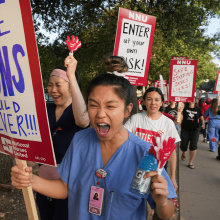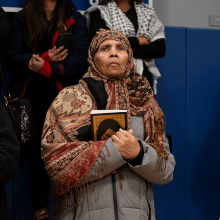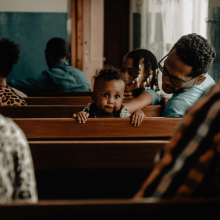News
Gabriel Salguero, president of the National Latino Evangelical Coalition, said the results show an increasing interest from everyday evangelicals — even urgency — to receive guidance on the issue from the pulpit. “More and more evangelicals are looking to scripture and what it has to say about the immigrant, the refugee, and the stranger,” he said. “Evangelicals want to move beyond just political talking points and be discipled on immigration reform.”
According to a recent Pew Research Center survey, religious Americans differ widely on how they refer to the increase in arrivals at the border. While only 45 percent of all U.S. adults say the large number of migrants is a “crisis,” majorities of white Christian groups — 70 percent of white evangelical Protestants, 64 percent of white Catholics, and 57 percent of white non-evangelical Protestants — feel that it is. In comparison, only 32 percent of Black Protestants and 27 percent of the religiously unaffiliated, or “nones,” say the situation at the border constitutes a “crisis.”
A new report from Pew Research Center found that while most Americans think religion has a positive influence on American life, few are willing to have discussions about religious differences.
The report revealed that a majority of American adults (80 percent) would say that “religion’s role in American life is shrinking,” which Pew reported as the highest in the survey’s history. Majorities in each religious group and the religiously unaffiliated say religion is losing influence.

Registered Nurse Alyson Wong marches on a picket line with striking nurses at Ascension Seton Medical Center in Austin, Tezas, on Tuesday June 27, 2023. Hundreds of nurses at the hospital participated in a one-day strike to call attention to what they describe as a staffing crisis and dismissive conduct by hospital administrators during contract negotiations.
One of the most troubling statistics in the country — the United States’ skyrocketing maternal mortality rate — isn’t much of a mystery to those who work in labor and delivery rooms. Underfunding, gaps in health care coverage, and hospital closures all contribute to the health care system’s state of crisis: When resources are stretched thin, birthing people, particularly Black and Latino people, and their babies don’t get the care they need.
Palestinians in Gaza held the first Friday prayers of Ramadan outside the ruins of a mosque leveled by Israel’s offensive, one of hundreds the Hamas-run authorities say have been damaged or destroyed by Israeli attacks since October.

Mourners attend a vigil service at the Prairie Activity & Recreation Center for Wadea Al-Fayoume, 6, a Muslim boy who according to police was stabbed to death in an attack that targeted him and his mother for their religion and as a response to the war between Israel and Hamas, in Plainfield, Illinois, Oct. 17, 2023. REUTERS/Jim Vondruska
Human rights advocates have cited a rise in Islamophobia, anti-Palestinian bias, and antisemitism in the U.S. and elsewhere.
In a Cleveland neighborhood, a set of 25 young trees line the space between the sidewalk and the road. The trees were planted by volunteers from Calvary Reformed Church in 2019, an example of the types of actions that churches can take to address rising heat in their neighborhoods. Now, thanks to 2022’s Inflation Reduction Act, nearly $1 billion will fund similar projects across the nation.
When Israeli troops stormed Nasser Hospital in southern Gaza, the ensuing chaos effectively shut down the hospital, with soldiers forcing women and children to leave the maternity ward according to Doctors Without Borders. The invasion of the hospital underscored the heavy toll the Israeli assault has had on pregnant people and infants. Doctors Without Borders described Israel’s incursion as forcing “inhumane” birthing conditions.
In the almost 23 years that Ivan Cantu has been on death row in Texas, a lot has changed: A trial witness admitted he lied on the stand. A true crime podcast revealed several forensic oversights in the details of Cantu’s case. And hundreds of thousands of people have petitioned for courts to reconsider the case. But one thing hasn’t changed: Cantu is still on death row, and his execution is now scheduled for Feb. 28. With few avenues of appeal left, a coalition of faith leaders, family members, and true crime podcast listeners say evidence that could prove Cantu’s innocence deserves to be heard by a court.
I asked my 3-year-old niece, Ember, what she learned in church. She said she learned about Jesus. “Who is Jesus,” I asked. “Where does he live?” She looked at me like I was an idiot, and then said, “Jesus is in our heart. Jesus helps us not be scared and not be afraid.”
New data finds that almost two-thirds of LGBTQ+ people who were raised Christian have since left the faith — and those who stay are typically older, Black, cisgender men and those who live in the South.
For more than a year, Riverton Park United Methodist Church in Tukwila, Wash., has been a cramped, uncomfortable shelter for hundreds of refugees. Neither designed nor intended to be a camp for those navigating the complicated immigration and asylum process, the ongoing situation has become a crisis, with the city declaring a state of emergency last October. Still, as Riverton Park remains unwilling to turn people away, the church and its neighbors, community organizers, and local government are all seeking solutions to the crisis.
Greece’s parliament approved a bill allowing same-sex civil marriage on Thursday, a landmark victory for supporters of LGBTQ+ rights that was greeted with cheers by onlookers in parliament and dozens gathered on the streets of Athens.
In a country where religious leaders openly condemn homosexuality and gay sex is punishable with jail time, Ghanaian couple Kay and Naa Shika fear more for their lives and safety than whether a church will bless their same-sex union.
When Pope Francis called for a global ban on surrogacy during a foreign policy address last month, non-Catholics, especially those in the United States, may have felt the subject came out of nowhere. Surrogacy is medically and legally regulated in the U.S. as an intervention recommended by the American Society for Reproductive Medicine for those who do not have the ability to become pregnant or carry a pregnancy to term. But the pope’s concern was beyond the ethics of procreation, as he positioned his pronouncement within the context of a global economy and exploitation of women.
“A child is always a gift and never the basis of a commercial contract,” Francis said. “At every moment of its existence, human life must be preserved and defended; yet I note with regret, especially in the West, the continued spread of a culture of death, which in the name of a false compassion discards children, the elderly and the sick.”
Many of today’s parents of young children represent a culture shift in regard to corporal punishment. Statistically, many of them were spanked as children but won’t continue that practice in their own parenting. Since the late 1990s, a growing body of research has led experts to advise against spanking, and parents have started to listen. But one group in particular stands by the practice: Christians.
Scorsese, talking about his upcoming film on the life of Jesus, told the Los Angeles Times: “I’m trying to find a new way to make it more accessible and take away the negative onus of what has been associated with organized religion.”
The World Court ordered Israel on Friday to prevent acts of genocide against the Palestinians and do more to help civilians, although it stopped short of ordering a ceasefire as requested by South Africa. While the ruling denied Palestinian hopes of a binding order to halt the war in Gaza, it also represented a legal setback for Israel, which had hoped to throw out a case brought under the genocide convention established in the ashes of the Holocaust.
The Centers for Disease Control and Prevention reported an over 1,000 percent rise in cases between 2012-2022, with a 32 percent rise from 2020 to 2021 alone, which doctors attribute to the pandemic’s strain on the health care system.
In Proverbs 22:6, the author commends parents and educators to “train up a child in the way he should go: and when he is old, he will not depart from it.” Yet thanks to harsh school punishment policies, including suspension for preschoolers, many children are being trained to see their own typical emotional or academic frustrations as cause for strict discipline — or even incarceration.

















